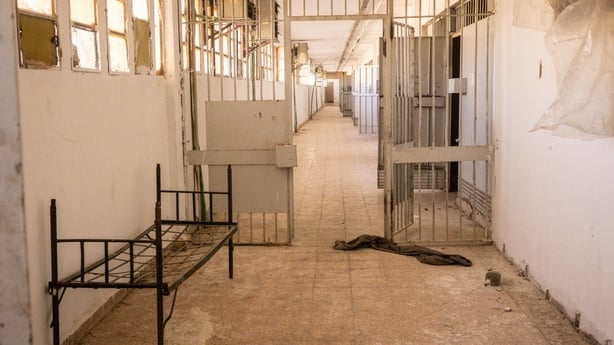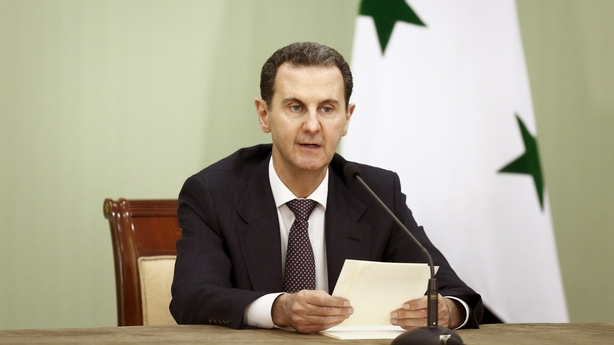The United States has made “direct contact” with Syria’s victorious Hayat Tahrir al-Sham rebels despite designating the group as terrorists, Secretary of State Antony Blinken said, as he sought international unity on a peaceful transition.
“We’ve been in contact with HTS and with other parties,” Mr Blinken told reporters after talks on Syria in the Jordanian Red Sea resort of Aqaba.
He did not give details on how the contact took place but when asked if the United States reached out directly, he said: “Direct contact — yes.”
Mr Blinken said that the contact was partly related to the search for Austin Tice, the US journalist kidnapped in 2012 near the start of the brutal civil war.
“We have pressed upon everyone we’ve been in contact with the importance of helping find Austin Tice and bringing him home,” Mr Blinken said.
He said that in the dialogue with HTS the United States also “shared the principles” on Syria that he has publicly laid out.
Mr Blinken indicated the United States was open eventually to easing sanctions on Syria but not yet.
Referring to HTS statements since their victory, Mr Blinken said: “We appreciate some of the positive words we heard in recent days, but what matters is action – and sustained action.
“This can’t be a decision on the events of one day,” he said.
If a transition moves forward, “we in turn will look at various sanctions and other measures that we have taken and respond in kind.”
Watch: Syrians wave shoes at passing Russian vehicles
We need your consent to load this comcast-player contentWe use comcast-player to manage extra content that can set cookies on your device and collect data about your activity. Please review their details and accept them to load the content.Manage Preferences
Mr Blinken was closing a regional tour in which he has sought common ground after HTS overthrew Bashar al-Assad, whose family ruled brutally for half a century.
In Aqaba, Mr Blinken took part in talks that brought together top Arab and European diplomats as well as Turkey, the main supporter of rebel groups in Syria.
In a joint statement, the participants called for a Syrian-led transition to “produce an inclusive, non-sectarian and representative government formed through a transparent process”.
The statement also stressed “respect for human rights”, the importance of combating “terrorism and extremism” and demanded “all parties” cease hostilities in Syria.
“Syria finally has the chance to end decades of isolation,” the group said.
UN Syria envoy Geir Pedersen earlier told Mr Blinken: “We need to make sure that state institutions do not collapse, and that we get in humanitarian assistance as quickly as possible.”
The United States and other Western governments classify HTS as a terrorist group due to its roots in Al-Qaeda’s Syria branch.
The designation severely impedes activities of businesses and aid workers who risk falling foul of US law enforcement if they are seen as directly supporting a terrorist group.
Since seizing power last weekend, rebel leader Abu Mohammad al-Jolani has spoken in conciliatory terms about making peace with the broad spectrum of Syrian society.
Some analysts note that HTS has not focused on US or other Western targets.

Few expect a quick move by the United States to lift the terrorist designation, especially with a political transition set next month following Donald Trump’s victory in the presidential election.
In Britain, a senior minister said that the government would decide quickly whether to remove the terrorist designation but Prime Minister Keir Starmer said it was still “far too early” to do so.
Mr Blinken said that he found hope in the street celebrations in Syrian cities in recent days.
“No one has any illusions about how challenging this time will be, but there’s also something incredibly powerful, the Syrian people determined to break with the past and shape a better future,” he said.
He also hailed the US-backed, Kurdish-led Syrian Democratic Forces for raising the new “independence” flag of the rebels, after for years flying their own flag as they achieved limited self-rule.
Mr Blinken said it was for Syrians to decide how to incorporate Kurds in the country but he hailed SDF fighters, who are bitterly opposed by Turkey, for their role in fighting the Islamic State group.
Tens of thousands missing
Sunni Muslim HTS is rooted in Syria’s branch of Al-Qaeda and designated a terrorist organisation by many Western governments.
The group has sought to moderate its rhetoric and the interim government insists the rights of all Syrians will be protected – as will the rule of law.
The European Union is seeking “to establish contacts” with the new leaders soon, an EU official told AFP on condition of anonymity.
The UN refugee agency said the new government had sent “constructive” initial signals, including asking the organisation to stay in the country.

Leaders of the G7 democratic countries, who met virtually yesterday, expressed hope for “a peaceful and orderly transition through the definition of an inclusive political process” in Syria.
Inside much of Syria, the focus is turning towards unravelling the secrets of Mr Assad’s rule, particularly the network of detention centres and suspected torture sites.
Syrians have descended upon prisons, hospitals and morgues in search of long-disappeared family and friends.
“I turned the world upside down looking,” Abu Mohammed told AFP as he searched for news of three missing relatives at the Mazzeh airbase in Damascus.
“We just want a hint of where they were,” he said.
The International Committee of the Red Cross said it documented more than 35,000 disappearances during Mr Assad’s rule, with the actual number likely far higher.
While Syrians celebrate the end of the regime, they face a struggle for necessities in a country impacted by war, sanctions and runaway inflation.
The EU announced yesterday the launch of an “air bridge” operation to deliver an initial 50 tonnes of health supplies via neighbouring Turkey.
Mr Assad was propped up by Russia – where a senior Russian official told US media he has fled – as well as Iran and Lebanon’s Hezbollah militant group.
Turkish Foreign Minister Hakan Fidan told NTV television that his country had urged Russia and Iran not to intervene militarily “to ensure minimum loss of life”.
The rebels launched their offensive on 27 November, the same day a ceasefire took effect in the Israel-Hezbollah war, which saw Israel inflict massive losses on Mr Assad’s Lebanese ally.
Both Israel and Turkey, which backs some of the rebels who ousted Mr Assad, have since carried out strikes inside Syria.
Israel’s latest strikes hit military sites in the Eastern Qalamun region, the Syrian Observatory for Human Rights war monitor said.
Israel has also sent troops into a UN-patrolled buffer zone that separated Israeli and Syrian forces on the Golan Heights, in a move the UN said violated a 1974 armistice.
The military has been ordered to “prepare to remain” there throughout the winter, Israeli Defence Minister Israel Katz’s office said.
